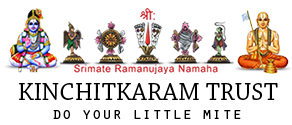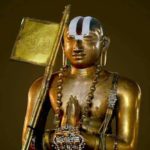Srimathe Ramanujaya Namaha,
Namaskaram Shesadri Swami and All Swami’s who has similar doubhts,
With Acharya ThiruvAdi Bhalam and Velukkudi Sri Krishnan Swami’s Aasirvadham, Adiyen will provide some insights to devareer’s initial question.
Since every one of the devotees doesn’t have the original Vedic Tamil knowledge Grammer and other translated Sanskrit language Knowledge Grammer, BhagavAn has given us an additional understandable language like “English” or in latest “Transformed Tamil language” which is a FACT which presents the same content as Original Tamil Veda.
Since all the devotees use English or transformed Tamil language to discuss the SAME VEDA CONTENTS of the Original Tamil Vedas, Adiyen will explain using the “Transitive Property of Equality“
If a = b, b = c, then a = c.
Vedas (a) = Thoughts of Veda Purusha (b),
Veda Purusha (b) = Supreme Sriman NarayanA (c) and HE IS Anaadhi,
then,
Vedas (a) = Sriman NarayanA (c) and hence Vedas are Anaadhi, since Vedas are MY thoughts which exists for ever, since “I” exist for ever.
We know Sriman NarayanA has “BODY” which means HE has Nose, Mouth Foot, Ears Eyes and Hands.
These Body Parts are called Angas which makes up a Body, so without angas body cannot exist.
We saw as per Transitive Property of Equality that,
Vedas (a) = Sriman NarayanA (c).
So if Sriman NarayanA has BODY Parts, then Vedas also has Body Parts.
Hence Vedas has Angas (body parts/Limbs) as well. Without Veda Angas (parts), the Vedas (body) cannot exist.
Veda Anga’s – The 6 Subsidiary / Anga’s / Limb’s of the Veda are
1)Shiksha – Science of Pronunciation – Phonetics & Phonology – Nose of Veda Purusha
2)Vyakaranam – Grammar and science of linguistics – Mouth of the Veda Purusha
3)Chandas – Science of Meters – Foot of the Veda Purusha
4)Nirukta – Etymology & Meaning of words – Ears of the Veda Purusha
5)Jyauthisha – Astronomy & Astrology – Eyes of Veda Purusha
6)Kalpam – Procedures to perform Vedic Ritual – Hands of Veda Purusha.
Chandah paadau shabda shaastram ca vaktram.
Kalpah paaNee jyautisham cakshushhee ca,.
Shikshah ghraaNam shrotram uktam niruktam
Vedasya angaani aahuretaani shhat
“The six organs of the vedas are: chandas (e mouth), kalpa (the pair of hands), astrology (the
pair of eyes), shiksha (the nose), niruktam (the pair of ears)”.
So let’s learn to apply the VEDIC content through the language which is close to ones heart, since content is important and language is only a MEDIUM/TOOL to convey the original Vedic content.
Adiyen (ElayaAlwar) Srinivasa (DhoddayAcharyar) Dasan.


